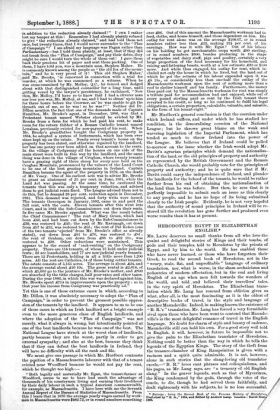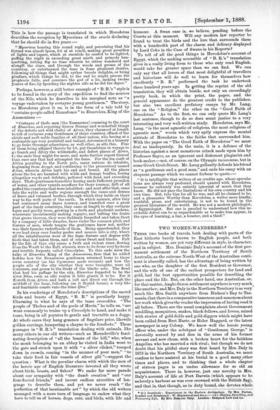HERODOTUS'S EGYPT IN ELIZABETHAN ENGLISH.*
• Euterpe : being the Second Book of the /knows History
of Herodotur. Burnished " B. R.," 1584, and Edited by Andrew Lang. Loudon ; David Nut 1888.
MR. LANG deserves no small thanks from all who love the quaint and delightful stories of Kings and their tombs, of gods and their temples, told to Herodotus by the priests of Egypt, and by him to the world. He has enabled those who have never learned, or those who have forgotten their Greek, to read the second book of Herodotus, not in the " weary, stale, flat, and unprofitable " langnage of ordinary translation, nor, what is worse, in the sham archaicisms and pedantries of modern affectation, but in the real and living English of an age when men felt towards the wonders of the world, and told . and believed their travellers' tales, in the very spirit of Herodotus. The Elizabethan trans- lation which Mr. Lang has rescued from oblivion gives us what, after all, is the most fascinating as it is the oldest of descriptive books of travel, in the style and language of another Maundeville. Indeed, in making known the existence of " B. R.'s " translation, Mr. Lang has forced a very formidable rival upon those who have been wont to contend that Maunde- ville's is the most delightful romance of travel in the English language. No doubt for charm of style and beauty of cadence,. Maundeville still can hold his own. For a good story well told in English, it will, however, in future be impossible not to give the palm to the Elizabethan translator of Herodotus., Nothing could be better than the way in which he tells the legends of the Egyptian Kings. The story of the theft from the treasure-chamber of King Rampsinitus is given with a. raciness and a spirit quite admirable. It is not, however,. alone in such stories that the slang-loving old translator excels,—" B. R." loves cant phrases and colloquialisms, and his pages, as Mr. Lang says, are " a treasury of old English slang." In the graver legends, such as that of Mycerinus„ the King condemned by the gods, through the voice of the
oracle, to die, though he had served them faithfully, and dealt righteously with his subjects, he is no less successful. This is how the passage is translated in which Herodotus describes the reception by Mycerinus of the oracle declaring that he should die in five years :—
"Mycerinus hearing this round reply, and pereeining that his thread was almoft fpoon, fet al at reuell, making great prouifion of lights and tapers, which at eventide he caufed to be lighted, paffing the night in exceeding great mirth and princely ban- quetting, letting flip no time wherein he either wandered not alongft the riuer, and through the woods and groues of the countrey, or entertayned the time in fome pleafaunt deuifes, following all things that might eyther breeds delights, or bring pleafure, which things he did, to the end he might prooue the prophecie falfe, and conuince the god of a lie, making twelue yeares of fire, by fpending the nightea alfo as he did the dayes."
Perhaps, however, a still better example of " B. R.'s " style is to be found in the story of the expedition to find the sources of the Nile, which he describes in his marginal note as "a voyage vndertaken by certayne young gentlemen." The story, as Herodotus gives it us, is in the form of a tale told by " certain people called Namafones " to Etearchus, King of the Ammonians
" Certayne of thefe men [the Namasones] comming to the court of Etearchus, and reporting dyuers ftrange and wonderfull things of the deferts and wild chafes of Africa, they chaunced at length to tell of certayne yong Gentlemen of theyr countrey, iffued of the chiefs and moft noble families of all their nation, who beeing at a reafonable age very youthfull and valiant, determined in a brauery to go feeke ftraunge aduentures, as well other, as alfo this. Fiue of them being affig,ned thereto by lot, put themfelues in voyage to go fearch and difcry the wilderneffe, and defert places of Africa, to the ende they might fee more, and make further report thereof than euer any that had attempted the fame. For the fea coaft of Africa poynting to the North pole, many nations do inhabits, beginning from Aeitypt, and continuing to the promontory named Balms, wherein Africa bath his end and bound. All the places aboue the fea are haunted with wilds and fanage beaftes, beeing altogether voyde and defolate, poftered with farad, and exceeding drye. Thefe gentlemen-trauellers hauing made fufficient prouifion of water, and other vyands neceffary for theyr iourney, firft of all paffed the countreys that were inhabited : and next after that, came into the wylde and wafte regions amongft the canes and dennes of fierce and vntamed beaftes, through which they helde on theyr way to the weft parte of the earth. In which manner, after they had continued many dayes journey, and travelled ouer a great part of the fandy countreys, they came at length to efpy certayne fayre and goodly trees, growing in a frefh and pleafaunt medowe, wherevnto incontinently making repayre, and tafting the fruits that grewe thereon, they were fuddenly furprifed and taken fhort by a company of little dwarfes, farre under the common pitch and ftature of men, whofe tongue the gentlemen knew not, neither was their fpeache vnderftoode of them. Being apprehended, they ware lead away ouer fundry pooles and meares into a city, where all the inhabitauntes were of the fame ftature and degree with thofe that had taken them, and of colour fwart and blacke. Faft by the fide of thys city ranne a fwift and violent finer, flowing from the Weaft to the Eaft, wherein were to be feene very hydeous and terrible ferpents called Crocodyles. To this ende drew the talke of Etearchus King of the Ammonians, faue that he added befides how the Namafonian gentlemen returned home to theyr ovine countrey (as the Cyrosneans. made recount) and how the people alfo of the city whether they were broughte, were all conjurers, and geuen to the ftudy of the blacke arts. The fiend that had his paffage by the city, Etearchus fuppofed to be the river Nilus, euen as alfo reafon it felfe giueth it to be. For it floweth from Africa, and bath a tuft and direct cut through the middeft of the fame, following (as it fhould feeme) a very like and femblable courfe unto the riuer Ifter."
In his renderings of Herodotus's descriptions of the sacred birds and beasts of Egypt, " B. R." is peculiarly happy. Charming is what he says of the tame crocodiles. "The people of Thebes and of the poole of Maoris," he tells us, "are wont commonly to traine vp a Crocodyle to hand, and make it -tame, being in all poyntes fo gentle and tractable as a dogge. At whofe eares they hang gepames of fingulare price, likewife golden eareings, hampering a chayne to the forefeete." These passages in " B. R.'s " translation dealing with animals, like many others in our old writers—such as Maundeville's fasci- nating description of "all the beasts of the hill," who, when the monk belonging to an abbey he visited in India went to the gate and struck upon it with " a silver clicket," trooped down in crowds, coming "in the manner of poor men," "to take their food in fair vessels of silver gilt "—suggest the question : What is the peculiar charm with which the men of the heroic age of English literature invested all they wrote about birds, beasts, and fishes P We make far more parade about our sympathy with "the dumb creation" and " our four-footed friends," and invent endless atrocities of lan- guage to describe them, and yet we never reach " the perfection of that inestimable art" by which the old writers managed with a mere turn of language to endow what they have to tell us of horses, dogs, cats, and birds, with life and
humour. A Swan case is, we believe, pending before the Courts at this moment. Will any modern law reporter be found to treat the birds and the lore that surrounds them with a hundredth part of the charm and delicacy displayed by Lord Coke in the Case of Swans in his Reports? To tell of all the good things in Herodotus's account of Egypt, which the making accessible of " B. R.'s " translation gives in a really living form to those who only read English, would take far greater space than we can find. We can only say that all lovers of that most delightful of travellers and historians will do well to learn for themselves how excellently " B. R." performed the task he undertook three hundred years ago. In letting the reprint of the old translation, they will obtain beside, not only an exceedingly pretty book, in which the print, the paper, and the general appearance do the greatest credit to the publisher, but also two excellent prefatory essays by Mr. Lang, one on the " Religion," the other on the " Good Faith of Herodotus." As to the first, we can only quote Mr. Lang's last sentence, though to do so does scant justice to a very interesting and very well-written study. Herodotus, says Mr. Lang, " is the moat agnostic of religious, the most religious of agnostic men," words which very aptly express the mental attitude of Herodotus to the faiths that surrounded him. With the paper on " The Good Faith of Herodotus " we must deal as inadequately. In the main, it is a defence of the historian against a most monstrous attack made upon him by Professor Sayce, as an ignorant and dishonest plagiarist and book-maker,—not, of course, on the Olympic racecourse, but in some Greek Grub Street. Mr. Lang gallantly defends his friend as " a gentleman and a good man," and ends his essay with an eloquent passage which we cannot forbear to quote :—
" It is intelligible that writers of an erudite age. whose specula- tions are always very profound, should quarrel with Herodotus, because he certainly was entirely ignorant of much that they know. He did not pass the limitations of his own country and his own time. But, take him for all he was, and all he claimed to be, and a pleasanter Worthy than Herodotus, a writer more kindly, truthful, pious, and entertaining, is not to be found in the greatest literature of the world. He was not a modern philologist, or Egyptologist. But one is puzzled to understand how this in- evitable defect can be so unpardonable as to make him appear, in the eyes of learning, a liar, a boaster, and a thief."



































 Previous page
Previous page